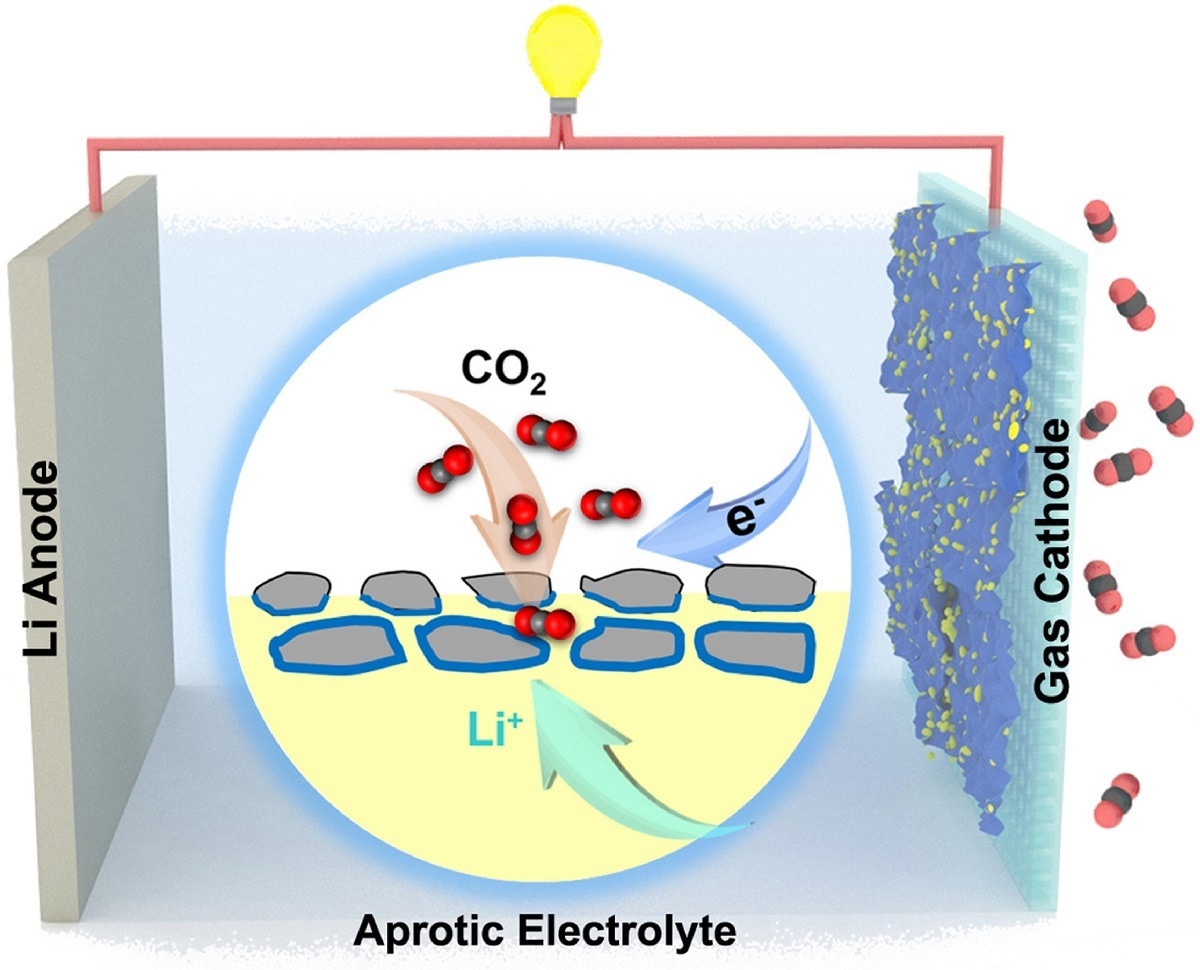Metal-carbon dioxide batteries show immense potential as an eco-friendly technology; however, their energy efficiency is inadequate. A research group co-directed by chemists from the City University of Hong Kong (CityU) has discovered a ground-breaking method to surpass this issue by adding an unusual phase nanomaterial as a catalyst, improving battery energy efficiency by up to 83.8%.

Schematic illustration of the aprotic Li-CO2 battery. Image Credit: Zhou, J. et al, Proceedings of the National Academy of Sciences
The study presents a unique design of catalysts for a new class of meta-gas batteries that can benefit carbon-neutral goals.
The metal-carbon dioxide battery can offer long-lasting electricity (high energy density) for electronics and facilitate carbon dioxide (CO2) fixation without additional energy consumption from an outer circuit to turn CO2 greenhouse gas emissions into value-added items.
The lithium-carbon dioxide battery possesses a high theoretical energy density of 1876 Wh kg-1, making it a favorable option for advanced high-performance energy conversion and storage technology.
Nevertheless, metal-CO2 batteries still experience slow reaction kinetics. This results in large over-potential (i.e., more energy or voltage is necessary than is theoretically proven to stimulate the oxidation-reduction reaction that makes the battery function), poor reversibility, low energy efficiency, and inadequate cycling stability.
Technical Hurdles in Traditional Catalyst Modification Strategies
Researchers commonly consider morphology, size, constituents, and distribution of metal-based components in composite cathode catalysts to be the main concerns that lead to differences in battery performance.
Dr. Fan Zhanxi, Study Lead and Assistant Professor, Department of Chemistry, City University of Hong Kong
“But we found preparing novel catalysts with unconventional phases to be a feasible and promising strategy to boost the energy efficiency and performance of metal-gas batteries, especially since traditional modification strategies for catalysts have encountered long-term technical hurdles,” Dr. Fan Zhanxi added.
Dr. Fan and his team gathered wide-ranging knowledge associated with the exact management of the crystal phase of metal-based nanomaterials, which allowed them to choose ideal elements to build their unusual phases and then explore the effect of the crystal phase of catalysts on the reaction kinetics of a particular type of aprotic (i.e., not including hydrogen ions) metal-gas electrochemistry.
However, this does not mean that this process is easy to realize because it involves strict requirements on the bifunctionality of cathode catalysts in an organic environment.
Dr Fan Zhanxi, Study Lead and Assistant Professor, Department of Chemistry, City University of Hong Kong
The researchers produced iridium nanostructures with an unusual 4H/face-centered cubic (fcc) heterophase by regulating the growth kinetics of Ir on gold (Au) templates.
During the experimental phase, the catalyst comprising 4H/fcc heterophase showed a higher energy efficiency of up to 83.8% and a lower charge plateau (below 3.61 V) while cycling in aprotic Li-CO2 batteries than other metal-based catalysts (typically with charge potential of more than 3.8 V and energy efficiency up to 75%).
Outstanding Performance of Unconventional Phase Metal Nanomaterials
The combination of theoretical calculations and experiments carried out by the researchers exposed that 4H/fcc Ir nanostructures formed through phase engineering are more promising for the reversible development of amorphous/low-crystalline discharge items, thereby minimizing the overpotential and boosting the cycling steadiness of electrochemical redox reactions.
The unconventional phase 4H/fcc Ir nanostructures did a lot better than standard fcc Ir and realized excellent charge potential and energy efficiency than other established metal-based catalysts applied in aprotic Li-CO2 batteries.
This study reveals the great potential of phase engineering of catalysts in metal-gas electrochemistry. It opens up a new direction to design catalysts for developing sustainable electrochemical energy conversion and storage systems.
Dr Fan Zhanxi, Study Lead and Assistant Professor, Department of Chemistry, City University of Hong Kong
The results were published in the scientific journal Proceedings of the National Academy of Sciences (PNAS). The first authors are Mr. Zhou Jingwen and Dr. Liao Lingwen, from CityU, Dr. Wang Tianshuai from The Hong Kong University of Science and Technology (HKUST), and Mr. Chen Lin from the China Academy of Engineering Physics (CAEP).
The corresponding authors are Dr. Fan Zhanxi, from CityU, Professor Zhao Tianshou, from HKUST, Professor Gu Lin, from the Institute of Physics at the Chinese Academy of Sciences, and Professor Cheng Jianli, from CAEP.
The other CityU team members are Professor Lee Chun-Sing, Dr. Guan Zhiqiang, Dr. Chen Bo, and a group of Ph.D. students from the Department of Chemistry. The main funding sources included the National Natural Science Foundation of China (NSFC), the Hong Kong Branch of the National Precious Metals Material Engineering Research Center (NPMM), the Innovation and Technology Commission (ITC) of Hong Kong, and CityU.
Journal Reference
Zhou, J., et al. (2022) Boosting the reaction kinetics in aprotic lithium-carbon dioxide batteries with unconventional phase metal nanomaterials. Proceedings of the National Academy of Sciences. doi.org/10.1073/pnas.2204666119.
Source: https://www.cityu.edu.hk